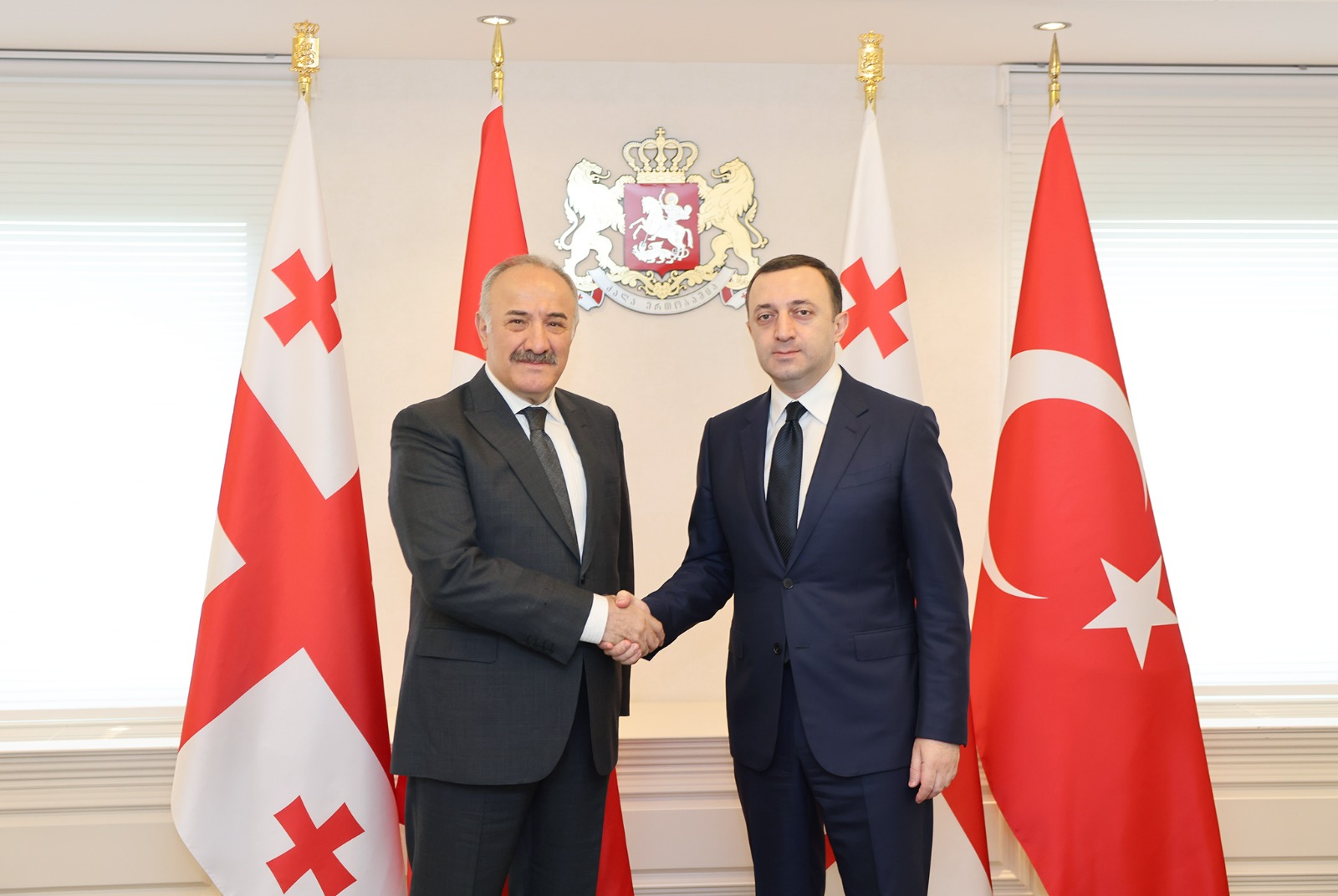In a nutshell, friendly relations between Georgia and Turkey are not a deterrent against potential Russian aggression against Georgia.
Russia can always impose a blockade of Georgia’s Black Sea coast by using its naval assets in Sevastopol, Crimea and Ochamchire in occupied Abkhazia, thereby effectively ‘strangling’ the nascent Georgian Coast Guard. However, despite being somewhat politically marginalised by the West, Turkey remains a crucial partner for Georgia.
Introduction
Georgian–Turkish relations are in essence cordial but not equal. Georgia’s Prime Minister, Irakli Garibashvili, is viewed as a junior partner in the relationship with President Recep Tayyip Erdoğan. For Georgia, Turkey represents an important partner in the volatile South Caucasus region. At the same time, enjoying friendly relations with Georgia as a transit country for oil, gas and cargo trains from Azerbaijan to Turkey, known as the Baku-Tbilisi-Kars (BTK) railway, is important for Turkey.
Moreover, cargo transferred by road from Russia and Azerbaijan via Georgia to Turkey is a basic necessity. Bilateral relations are mainly focused on the economy and, occasionally, the Turkish military donates or sells military equipment to the Georgian Defence Forces (GDF). The Turkish Government also offers modest military assistance to Georgia worth about USD 10 M to USD 15 M which is about 50–60% less than Georgia receives annually from the United States. That being said, Turkish military assistance is highly appreciated by Georgia. Russia looks unfavourably at Ankara’s military assistance to Georgia, however, it knows that Turkish assistance is not changing the balance of power and, as a result, tolerates it.
From Turkish Military Equipment to Georgia to Joint Exercises
Military equipment flows between the two sides have been relatively modest, but bear relevance for Georgia in particular.
In July 2022, the Georgian Defence Ministry announced that the GDF would receive NATO-standard armoured personnel carriers (APCs) with their equipment and sub-systems after the defence ministry and Turkish company, ASFAT, signed a deal. Neither the model of vehicle, nor their number and value were disclosed. The same Turkish company also signed an agreement with Georgia to supply fire extinguishing kits in September 2022; the value of that contract was also not disclosed. It is known, however, that the kits will be locally manufactured in Georgia.
Georgia’s Aviation and Air Defence Command has received two units of airfield specialist equipment and spare parts for UH-1H Huey helicopters from Turkey free of charge in December 2022. In January 2021, the Georgian Defence Ministry said: “Turkey donated laser rangefinders and various pieces of engineering equipment. The donated equipment was assigned to various combat and engineering regiments.”

Credit: Government of Georgia
On the training front, joint exercises have been picking up recently. Moscow announced that it was closely following the progress of the Noble Partner 2022 military exercise in Georgia. For the Georgian Defence Ministry, the purpose of the exercise is to increase the readiness and interoperability between Georgia, the US, regional partners and allied countries and work towards a secure environment around the Black Sea region. The exercise took place for the first time since 2020 when COVID restrictions were in full force globally. According to the Russian Foreign Ministry, work was underway to transfer heavy equipment from European countries in the NATO Alliance to Georgia, this time by land from Turkey. Emphasis on the land transfer from Turkey is an important point because this had been carried out by sea from Romania until recently. In addition to the annual Noble Partner exercise, it is important to mention the trilateral military exercise between Azerbaijan, Georgia and Turkey.
The Special Operations Forces (SOFs) units of Azerbaijan, Georgia and Turkey launched the annual joint Caucasus Eagle 2022 exercises last year on 11 October, and which are hosted by Georgia in 2023. According to the Georgian Defence Ministry: “The purpose of the training is to deepen the coordination of SOF units of Azerbaijan, Georgia, and Turkey. To that end, the trio will share their experience with each other, increase interoperability and improve command capabilities.” The first Caucasus Eagle exercise took place in 2017.
Bilateral Economic Relations
According to the Adjara Employment Agency, more than 17,000 people moved from Georgia to Turkey for employment opportunities between June 2020 and April 2021, despite COVID restrictions. The agency did not provide updated data on the number of Georgians employed in Turkey in 2023.
According to data from the National Statistics Service of Georgia (Geostat) for 2022, Turkey represents Georgia’s main trading partner with turnover between the countries exceeding USD 2.8 Bn, with USD 2.4 Bn earned from imports. Exports from Georgia to Turkey amount to about USD 435.5 M. The country’s largest trading partners after Turkey were Russia (USD 2.48 Bn) and China (USD 1.86 Bn). According to Geostat data published on 19 June 2023, Turkey was Georgia’s largest trade partner with USD 1.2 Bn in trade volume, followed by Russia with USD 1.06 Bn, and China with USD 623.3 M. In other words, Turkey’s exports to Georgia are in full swing.
Azerbaijan’s President, Ilham Aliyev, said in December 2022: “Azerbaijan and Turkey want to increase the capacity of the BTK railway from the current one million tonnes of cargo to five million tonnes per year. In order to achieve this, USD 100 M will be invested”, however Aliyev did not specify the time frame. At the same time, the idea to use BTK railway infrastructure for the overnight passenger train failed to materialise, although the Caucasus Business Week published a report in 2019 claiming that the first passenger train had arrived in Georgia using the BTK railway.
However, Executive Head of the Passenger Transport Department at Azerbaijan Railways, Azer Farajov, said in an interview with APA on 8 August 2023: “In line with our post-[COVID] pandemic measures, which involve the reopening of cross-border travel, the idea of operating a high-speed passenger train on the Baku-Tbilisi-Ankara route is being explored.” Whether or not the idea of a high-speed passenger train is financially viable and if there will be enough travellers remains to be seen.
Erdoğan and Aliyev’s insistence on opening rail and road infrastructure via the so-called Zangezur Corridor linking Azerbaijan via Armenia to the Azerbaijani exclave of Nakhichevan to Turkey may have negative consequences for Georgia. If and when such a ‘corridor’ will be opened, it will downgrade the importance of Georgia as a rail and road transit link between Azerbaijan and Turkey because of the shorter distance. Furthermore, such a corridor will be a preferable route for China’s Belt and Road Initiative (BRI). At the moment, Armenia and Iran are firmly against the opening of such a corridor and therefore its current and future prospects remain uncertain.

Credit: Giorgi Balakhadze, via Wikimedia Commons
Earthquakes in Turkey and Landslides in Georgia
The Turkish Ambassador to Georgia, Ali Kaan Orbai, said in February 2023 regarding the devastating earthquake in south-eastern Turkey: “Georgia was one of the first countries to offer aid to Turkey.” Georgia deployed rescue teams and sent more than 100 tonnes of humanitarian assistance. The government allocated GEL1 M from its reserve fund for humanitarian aid for Turkey. The Georgian Government said in its statement: “The employees of the Interior Ministry’s Emergency Management Service will be deployed to deal with the consequences of the earthquakes in Turkey.” Garibashvili met with Erdoğan in Ankara on 23 February 2023, who thanked him for the rapid assistance provided [by Georgia] at this difficult time.
In the case of the landslide disaster in Shovi, Georgia, on 3 August 2023, Georgian government officials were criticised for refusing assistance from Turkey and Azerbaijan in the rescue operation.
Turkey’s parliamentary and presidential Elections
Prior to the aforementioned elections in May 2023, Georgian political experts and economists were unanimous in their understanding, that no matter the outcome of the elections, substantial changes in Georgian–Turkish relations should not be expected. For now, bilateral relations remain solid; the last 20 years have shown the strength, resilience and steadfastness of this relationship.
Although Erdoğan’s government has officially supported Georgia’s quest to join NATO, the strength of this support at the Alliance is not always as decisive as it could be, and the Georgian Government should remember this. Furthermore, the Turkish Government is neither willing nor able to provide security guarantees to Georgia. Russia opposes Georgia’s NATO membership and Turkey is well aware of this. As a result, it can be surmised that Turkey will not court confrontation with Russia over Georgia’s NATO membership aspirations.
Impact on Russia
When assessing Georgian–Turkish relations, Russian President, Vladimir Putin knows that Turkey, despite its friendly relations with Georgia, will not come to its rescue should Russia decide to attempt to bring Georgia under its control. Moreover, if Putin and Erdoğan decide one day in the future to divide Georgia into their spheres of influence, the international community will be stunned but will not involve itself militarily on the side of Georgia.
Although such a scenario sounds far-fetched or even unthinkable at the moment, it cannot be dismissed out of hand. The Georgian Government needs to learn from the example and experience of Ukraine; namely, that the international community is ready to support the underdog militarily when it fights for its survival alone.
Today, one can say that Georgian–Turkish relations are on a solid footing. Georgia highly appreciates Turkey’s modest military assistance. Bilateral economic relations and Georgia being a transit country for oil, gas and cargo sent via BTK, in particular, and cargo sent by roads that link Russia and Azerbaijan to Georgia and Turkey, in general, remain key for maintaining useful and mutually-beneficial relations. At the same time, the Georgian Government needs to be realistic and understand that Turkey is an important partner, but Georgia is not and will not be a top priority for Turkey. Aside from this, Turkey’s voice in the Alliance is not sufficiently decisive when it comes to advancing Georgian interests in NATO.
Therefore, Georgia needs to rely on itself. In this regard, Russia is well-aware of Georgia’s vulnerabilities. As a result, it maintains a tacit understanding with the Georgian Government that bilateral economic relations between the two neighbouring countries represent the basis for bringing them closer to one another and keeping Georgia away from its Euro-Atlantic goals. However, if worse comes to worst, and Putin’s administration decides to invade Georgia again, Turkey will likely remain neutral.
Eugene Kogan











